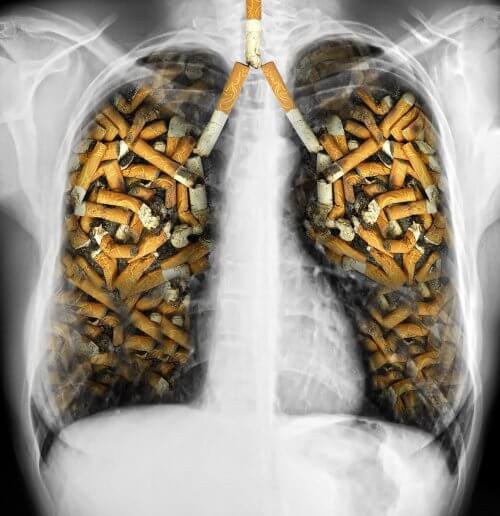How Many Years Does Smoking Take off Your Life?


Reviewed and approved by the psychologist Bernardo Peña
Many people still think that smoking is harmless, until they start dealing with the consequences. People fail to realize how harmful it can truly be. Cigarettes contain lots of toxic substances that can affect many organs in the body and cause serious diseases like cancer. But is there a way to know how many years smoking takes off your life?
The consequences of smoking

According to figures from the World Health Organization, each year more than 8 million people die as a result of cigarettes. About 7 million of those people are active smokers, and 1.2 million of whom are passive smokers.
According to experts, smoking can also cause other diseases, such as:
- Heart disease.
- Stroke
- Emphysema or chronic pulmonary obstructive disorder (COPD)
- Bronchitis
- Lung cancer, esophageal cancer, pancreatic cancer, and skin cancer, among others.
Read more:
How many years does smoking take off your life?

A recent US study by researchers from the U.S., Canada, and the UK found that smoking can take off up to 10 years of your life expectancy. They conducted the study to determine the dangers of tobacco use and the benefits of quitting. It was published in the New England Journal of Medicine in 2013.
The study found that non-smokers are twice as likely to reach age 80 as people who smoke.
Is it possible to quit smoking?

You might like:
But with some willpower and a positive attitude, it is possible to quit smoking. It just may take several attempts. You might also want to try seeking professional help.
The site SmokeFree, from the National Institute of Health in the U.S., offers some tips about quitting and staying the course in spite of being tempted to start again:
- Gradually quitting: If you don’t feel like you’d be able to quit cold turkey, try to gradually reduce the number of cigarettes you smoke a day until you get to zero. Try smoking half as many and reduce the amount you smoke day by day.
- Nicotine alternatives: Alternative nicotine delivery methods involve products that replace the high amounts of nicotine in cigarettes with smaller doses. They come as patches, gum, lozenges, and nasal sprays, to name a few examples. This method is good for reducing cigarette cravings until you experience none at all.
- Acupuncture: This ancient Chinese medical technique might help you control cravings. It’s relaxing and can really be good for you if you’re committed to quitting smoking, according to some studies.
We know that quitting smoking isn’t easy, but it’s worth it. If you’re a smoker, take that first step towards quitting, and live a longer and healthier life.
All cited sources were thoroughly reviewed by our team to ensure their quality, reliability, currency, and validity. The bibliography of this article was considered reliable and of academic or scientific accuracy.
- Alavanja, M., Baron, J. A., Brownson, R. C., Buffler, P. A., DeMarini, D. M., Djordjevic, M. V., … Zaridze, D. (2004). Tobacco smoke and involuntary smoking. In IARC Monographs on the Evaluation of Carcinogenic Risks to Humans. https://doi.org/10.1007/978-1-61737-995-6_3
- Becoña, E. (2003). Tabaco, ansiedad y estrés. Revista Salud y Drogas.
- Doll, R., & Hill, A. B. (1999). Smoking and carcinoma of the lung: Preliminary report. Bulletin of the World Health Organization. https://doi.org/10.1136/bmj.2.4682.739
- Hidalgo, J. A. G., Piedra, J. A. D., Díaz, K. A., & González, M. M. A. (2012). Hábito de fumar en la adolescencia. Revista Cubana de Medicina General Integral.
- National Institute On Drug Abuse. (2008). Adicción al tabaco. National Institute On Drug Abuse.
- Schroeder, S. A. (2013). New Evidence That Cigarette Smoking Remains the Most Important Health Hazard. New England Journal of Medicine. https://doi.org/10.1056/NEJMe1213751
- Tonstad, S. (2009). Cigarette smoking, smoking cessation, and diabetes. Diabetes Research and Clinical Practice. https://doi.org/10.1016/j.diabres.2009.04.013
This text is provided for informational purposes only and does not replace consultation with a professional. If in doubt, consult your specialist.








